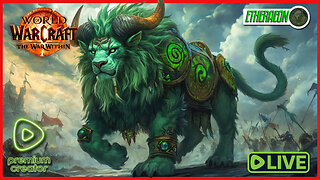Premium Only Content

Episode 1557: Into the Hands I commend my spirit
A good friend texted me and asked what he should do when the priest comes to give his mother-in-law a blessing before she passed away. He said she is very close to death. So I said please don’t let him just give her a blessing but have him give her extreme unction. For any of you that do not know what that entails I have done an entire episode on Extreme Unction that you can watch or you can look it up but the important thing to always remember is never let your modern church rob you or your loved ones the traditional last rights because you immortal soul could depend upon it do to the sacrament of confession and the receipt of the holy eucharist (Viaticum).
But what I want to speak about is what I thought immediately after texting him. I though “Wow here is an elderly woman ready to meet her maker!” This is it for her. Her whole life she practiced her faith and now she will meet Christ and be judged. That is a powerful moment and yet for some it comes upon them very quick and suddenly for them and their family. Yet most people don’t want to talk about it and at times look away from the very important matter of what is next.
The other thing I thought is what model do we as Catholics draw from.
"And Jesus crying out with a loud voice, said: Father, into thy hands I commend my spirit. And saying this, he gave up the ghost." (Luke 23:46
These were the very last words Christ spoke before he died. You will notice there is this fascination with what were the very last words of celebrities. Why? Because they were bigger than life and people are trying to draw inspiration from their last words. Yet in most cases their last words were much like the life they lived like Marlon Brando who said “what was that all about”.
In traditional Catholic theology, the words "Into thy hands I commend my spirit" spoken by Jesus on the cross are seen as an expression of complete trust and surrender to the will of God the Father.
Complete Trust in the Father: By uttering these words, Jesus is demonstrating His complete trust in the Father's plan. Despite the intense suffering He was undergoing, Jesus willingly submits Himself to God's providence.
Divine Providence: In Catholic teaching, God is seen as the ultimate provider and sustainer of all creation. Trust in the Father involves believing that He has a plan for every individual's life, and that He will guide and care for them, even in times of trial and suffering.
Abandonment to Divine Providence: This concept, often attributed to the 17th-century French priest Jean-Pierre de Caussade, emphasizes the idea that complete trust in God involves an abandonment of oneself to His will. It means accepting whatever comes, whether it be joy or suffering, as coming from the loving hand of God.
Faith in God's Wisdom and Goodness: Trust in the Father implies a profound belief in His wisdom and goodness. It means recognizing that God's plan, even if it may be difficult to understand in the moment, is ultimately for the best.
Confidence in God's Love: Catholics believe that God's love for humanity is boundless and unconditional. Trust in the Father is rooted in the confidence that He cares deeply for each individual and desires their ultimate well-being and happiness.
Surrendering Control: Trusting in the Father often involves relinquishing a sense of control over one's life. It means acknowledging that God's ways are higher than human ways, and that His plans may not always align with our own desires or expectations.
Finding Peace in God's Will: Trusting in the Father brings a sense of peace, even in the midst of difficult circumstances. It means accepting that God's will is sovereign and that His grace is sufficient to sustain and carry us through any situation.
Learning from Jesus' Example: Jesus' entire life, including His words on the cross, serves as the ultimate example of complete trust in the Father. His obedience, even unto death, demonstrates the perfect union and harmony between the Father and the Son.
Ultimately, complete trust in the Father is an act of faith that acknowledges God as the source of all goodness and the ultimate destination of the human soul. It involves a surrender of self-will in favor of God's perfect and loving plan for each individual's life. This trust is nurtured through prayer, reflection on Scripture, and a deepening relationship with God through the sacraments of the Church.
Fulfillment of His Mission: This statement signifies that Jesus has accomplished the mission entrusted to Him by the Father. He has willingly offered Himself as a sacrificial lamb for the redemption of humanity.
The concept of the fulfillment of Christ's mission is a fundamental aspect of traditional Catholic theology. It pertains to the understanding that Jesus came into the world with a specific purpose, which He accomplished through His life, teachings, death, and resurrection. Here's a deeper exploration:
Redemption and Atonement: Central to Christ's mission was the redemption of humanity from sin and the reconciliation of humanity with God. Through His sacrificial death on the cross, Jesus offered Himself as the perfect atoning sacrifice, reconciling humanity with God and making possible the forgiveness of sins.
Restoration of God's Kingdom: Christ's mission also involved the establishment of God's kingdom on earth. He preached about the Kingdom of God, which was not an earthly kingdom, but rather a spiritual reign of God in the hearts of believers. His teachings emphasized love, mercy, justice, and the reign of God's grace.
Victory Over Evil and Death: Jesus' mission was to triumph over the forces of evil, including sin, death, and the devil. His resurrection from the dead demonstrated His victory over death and assured believers of their own future resurrection and eternal life.
Revelation of God's Love: Through His life and teachings, Jesus revealed the boundless love of God for humanity. He showed that God is not a distant or indifferent deity, but a loving Father who desires a personal relationship with each person.
Exemplar of Holiness and Obedience: Jesus' life served as a perfect example of holiness, obedience, and complete submission to the will of the Father. He demonstrated how to live a life in accordance with God's commandments and teachings.
Proclamation of the Good News: Christ's mission also involved the proclamation of the Gospel, which means "good news." He commissioned His disciples to spread the message of salvation, forgiveness, and reconciliation to all nations.
Unification of Humanity: Christ's mission aimed at bringing together people of all backgrounds and nations into a unified body of believers, known as the Church. He abolished the distinctions that divide humanity, uniting believers as brothers and sisters in Christ.
Eternal High Priesthood: As the eternal High Priest, Jesus offered Himself once and for all as a sacrifice for sin. He continues to intercede on behalf of believers before the Father, providing a bridge of communication between God and humanity.
In summary, the fulfillment of Christ's mission is the accomplishment of His divine purpose, which includes the redemption of humanity, the establishment of God's kingdom, the defeat of evil, and the revelation of God's love. Through His life, death, and resurrection, Jesus demonstrated the depth of God's mercy and provided a path for humanity to be reconciled with God and attain eternal life. This understanding forms the core of Catholic teaching and worship.
Unity with the Father: It highlights the deep union and communion that Jesus has with God the Father. He entrusts His spirit back to the Father from whom it came, symbolizing the eternal relationship between the Father and the Son.
The concept of unity with the Father is a central theological idea in traditional Catholicism. It pertains to the profound and intimate relationship that Jesus, as the Son of God, shares with God the Father. Here's a deeper exploration:
Eternal Relationship: In Catholic theology, the Father, Son, and Holy Spirit are understood as distinct persons within the Holy Trinity, yet they exist in an eternal and inseparable relationship. Jesus, as the Son, has existed in perfect communion with the Father from all eternity.
Mutual Love and Knowledge: The unity between the Father and the Son is characterized by a mutual love and knowledge that surpasses human understanding. They share a perfect, boundless love that is the very essence of their divine nature.
Source of Authority: Jesus frequently refers to the Father as the source of His authority. He affirms that His words and actions are in accordance with the Father's will, reflecting the complete harmony between them.
Co-Creator and Sustainer: Catholic theology teaches that the Father, Son, and Holy Spirit are co-creators and co-sustainers of the universe. They work together in perfect unity to bring about and maintain all of creation.
Incarnation and Redemption: The incarnation of Jesus, where He took on human flesh, is seen as a profound act of unity between the divine and the human. Through this act, Jesus became the bridge that reconciled humanity with God the Father.
Perfect Obedience: Jesus' earthly life was characterized by perfect obedience to the will of the Father. He repeatedly affirmed that He came not to do His own will, but the will of the One who sent Him. This obedience was a testament to their unity.
Prayer and Communion: Jesus' prayer life is often cited as an example of His deep communion with the Father. He frequently withdrew to pray, seeking guidance, strength, and communion with the Father.
Theological Foundation: The doctrine of the Trinity, which affirms the triune nature of God, underpins the understanding of the unity between the Father, Son, and Holy Spirit. The Son is eternally begotten of the Father, and the Spirit proceeds from both the Father and the Son.
Model for Believers: The unity between the Father and the Son serves as a model for the relationship that believers are called to have with God. Through faith and baptism, Christians are invited to share in the life and love of the Trinity.
In summary, the unity between Jesus and the Father is a foundational belief in traditional Catholicism. It emphasizes the inseparable relationship between the Father and the Son within the Holy Trinity. This unity is a source of theological reflection, spiritual inspiration, and a model for the relationship that believers seek to cultivate with God.
Example of Perfect Submission: Jesus' words serve as an example for all believers to trust in God's plan even in the midst of suffering and death. It's a model of perfect submission and obedience to the divine will.
The example of perfect submission, as exemplified by Jesus in traditional Catholic teaching, refers to His complete and unwavering obedience to the will of God the Father. Here's a deeper exploration:
Garden of Gethsemane: One of the most powerful examples of Jesus' perfect submission is seen in the Garden of Gethsemane. Faced with the imminent prospect of His crucifixion and the weight of the world's sins, Jesus prayed, "Father, if you are willing, take this cup from me; yet not my will, but yours be done" (Luke 22:42, NIV). This prayer signifies Jesus' willingness to submit to the Father's plan, even in the face of immense suffering.
Obedience in His Ministry: Throughout His earthly ministry, Jesus consistently demonstrated obedience to the Father's will. He spoke and acted in accordance with the divine plan, teaching love, forgiveness, and the Kingdom of God. He never deviated from the path set by the Father.
Humility and Servanthood: Jesus' perfect submission is intimately tied to His humility. He humbled Himself, taking on the form of a servant, and willingly accepted the limitations and sufferings of human existence (Philippians 2:5-8). This exemplifies His complete surrender to the Father's will.
Faithful Execution of His Mission: Jesus' life was devoted to fulfilling the mission entrusted to Him by the Father. He consistently sought to do what pleased God and to bring glory to His name.
Resisting Temptations: When faced with temptations from Satan, Jesus responded with Scripture and unwavering commitment to God's will (Matthew 4:1-11). He resisted worldly temptations and remained obedient to the Father's plan.
Teaching on Obedience: Jesus emphasized the importance of obedience to God's commandments and teachings. He said, "If you love me, keep my commands" (John 14:15, NIV). This underscores the integral connection between love for God and obedient submission to His will.
Acceptance of His Passion and Death: Jesus' submission reached its culmination in His acceptance of the crucifixion. He willingly endured the agony of the cross, trusting in the Father's ultimate plan for salvation.
Trust in God's Timing: Jesus demonstrated patience and trust in God's timing. He did not rush His ministry but followed the Father's lead, knowing that everything would unfold in accordance with the divine plan.
Reliance on the Holy Spirit: Jesus' submission was facilitated by the presence and guidance of the Holy Spirit. He relied on the Spirit's empowerment to carry out His mission.
In summary, the example of perfect submission in Jesus' life serves as a profound model for believers in their own journey of faith. It highlights the importance of trusting in God's plan, obeying His commandments, and surrendering one's own will for the greater purpose of God's kingdom. This example inspires Christians to seek alignment with God's will in their own lives, even in the midst of challenges and uncertainties.
Victory Over Death: By willingly surrendering His spirit to the Father, Jesus demonstrates His victory over sin and death. This act foreshadows His resurrection, showing that death does not have the final say.
the victory over death refers to the central event of Christ's resurrection from the dead. This event holds immense theological significance and is a cornerstone of the Christian faith. Here's a deeper exploration:
Conquering the Power of Sin: Through His resurrection, Jesus conquered the power of sin. His death on the cross served as a perfect atonement for humanity's sins, and His resurrection demonstrated that sin and death no longer held dominion over Him.
Defeating the Sting of Death: St. Paul eloquently writes, "Where, O death, is your victory? Where, O death, is your sting?" (1 Corinthians 15:55, NIV). This passage captures the triumphant nature of Christ's resurrection. Death, which had once been the ultimate consequence of sin, is now transformed into a gateway to eternal life.
Assurance of Resurrection for Believers: Christ's victory over death provides the assurance of resurrection for all believers. Just as Christ was raised from the dead, so too will those who believe in Him be raised to eternal life.
Prelude to the General Resurrection: Christ's resurrection serves as a prelude to the general resurrection of the dead that will occur at the end of time. It is a foretaste of the glory that awaits all who are in Christ.
Confirmation of Jesus' Identity: The resurrection serves as a powerful confirmation of Jesus' identity as the Son of God. It affirms His divine authority and vindicates His claims about Himself.
Foundation of Christian Hope: The victory over death is a source of hope for Christians. It assures them that the trials and sufferings of this present life are temporary, and that an eternal, glorious existence awaits them in the presence of God.
Source of Spiritual Power: The resurrection is the source of spiritual power for believers. It is through the risen Christ that believers are granted the Holy Spirit, who empowers them to live a life of faith, love, and obedience.
Defeating Despair: The reality of Christ's victory over death stands as a powerful antidote to despair. It reminds believers that no matter how difficult their circumstances, they can have confidence in the ultimate triumph of God's purposes.
Fulfillment of Prophecy: The resurrection fulfills numerous Old Testament prophecies that foretold the coming of a Messiah who would conquer death. For example, Psalm 16:10 prophesies that God's Holy One would not see decay.
In summary, the victory over death, as exemplified by Christ's resurrection, is a central and foundational truth of traditional Catholic theology. It represents the triumph of life over death, righteousness over sin, and hope over despair. This event is celebrated as the pinnacle of God's redemptive work and serves as a source of inspiration, comfort, and assurance for believers.
Connection to Psalms: These words echo a passage from the Book of Psalms, specifically Psalm 31:5, which says, "Into your hand I commit my spirit; you have redeemed me, O LORD, faithful God." This connection emphasizes the continuity of God's plan throughout salvation history.
The connection to Psalms in the context of Christ's words on the cross, "Into thy hands I commend my spirit," is significant in traditional Catholic understanding. This phrase echoes a verse from the Book of Psalms, which provides a prophetic framework for Jesus' act of entrusting Himself to the Father. Here's a deeper exploration:
Psalm 31:5: The verse that corresponds to Jesus' words on the cross is from Psalm 31:5, which in the Latin Vulgate (the Bible used in the Western Catholic tradition) reads: "In manus tuas commendo spiritum meum; redemisti me, Domine Deus veritatis." In English, this can be translated as: "Into your hands I commit my spirit; you have redeemed me, Lord, God of truth." This verse is often referred to as a messianic prophecy, as it expresses a profound trust and surrender to God.
Messianic Prophecy: Many passages in the Psalms are considered messianic, meaning they are understood to prophesy about the coming of the Messiah. Psalm 31:5 is recognized as one of these prophecies, anticipating the complete trust and surrender that the Messiah, Jesus, would display on the cross.
Fulfillment in Jesus' Life: By quoting from Psalm 31:5, Jesus is not only expressing His complete trust in the Father but also affirming His identity as the fulfillment of Old Testament prophecies. He is demonstrating that He is the promised Messiah who would willingly submit Himself to God's plan for the redemption of humanity.
Psalm 22 and Jesus' Crucifixion: Another significant connection is found in Psalm 22, which contains numerous details that eerily parallel the events of Jesus' crucifixion. This includes phrases like, "My God, my God, why have you forsaken me?" which Jesus also utters on the cross (Matthew 27:46).
Use of Psalms in Worship: The Psalms have been a central part of Jewish and Christian worship for millennia. They express a range of human emotions, from praise and thanksgiving to lament and supplication. They provide a rich tapestry of prayers and expressions of faith that resonate deeply with believers.
Jesus' Use of Scripture: Throughout His life and ministry, Jesus often drew on the Old Testament, including the Psalms, to teach, comfort, and clarify His mission. His use of Psalms demonstrates His deep familiarity with Scripture and His identification with the prophetic message of the Old Testament.
Encouragement for Believers: The connection to Psalms serves as a reminder to believers of the continuity of God's plan throughout history. It encourages them to find solace and inspiration in the timeless prayers and expressions of faith found in the Psalms.
In summary, the connection to Psalms underscores the prophetic nature of Jesus' words on the cross and highlights the rich tapestry of Old Testament prophecies that find their fulfillment in His life, death, and resurrection. It also emphasizes the enduring relevance of the Psalms in the worship and spiritual life of believers.
When Jesus speaks these words, He is demonstrating His unwavering trust and obedience to the Father's will, even in the face of immense suffering. This act is a pivotal moment in the Christian narrative, signifying the completion of His earthly mission and the ultimate victory over sin and death. It is a profound example for believers to entrust their lives and souls to God's providence with the same faith and surrender.
Yet what did Christ say right before those last words? “Father why has thy forsaken me”? Now doesn’t that seem fickle of Christ? Not at all and the next eposide will be on those words Matthew 27:46
-
 LIVE
LIVE
TheNateVibez
3 hours agoNOT ANOTHER WARZONE STREAMER✌ BOTDANSK🤖ARMYVET🫡
263 watching -
 1:33:54
1:33:54
Badlands Media
22 hours agoAltered State S3 Ep. 31: 17-Year Cycles, Trump’s Conviction & The Frequency of Fear
44.6K10 -
 LIVE
LIVE
Eternal_Spartan
2 hours agoLive - Eternal_Spartan Plays Elden Ring and Maybe Halo! | Come Join the Best Chat on Rumble!!!
182 watching -
 2:16:48
2:16:48
TheSaltyCracker
4 hours agoGreta Going to Get Blown Up ReeEEeeStream 06-04-25
103K165 -
 31:38
31:38
Glenn Greenwald
8 hours agoSen. Rand Paul On Opposing Trump's Big Beautiful Bill, Tariffs, His Role in the Senate, Ukraine, Free Speech, and More | SYSTEM UPDATE #464
81.8K75 -
 2:25:28
2:25:28
SlinginPies
2 hours ago🔴 LIVE - SLINGINPIES - WARZONE WEDNESDAY!
9.15K -
 LIVE
LIVE
Etheraeon
2 hours agoWorld of Warcraft: The War Within | BGs & Stuff | RestedXP
107 watching -
 2:02:21
2:02:21
Melonie Mac
5 hours agoGo Boom Live Ep 50!
30.9K4 -
 2:06:41
2:06:41
RiftTV/Slightly Offensive
5 hours agoBOMBSHELL: Jeffrey EPSTEIN Invested $170 Million in PALANTIR? | The Rift | Guest: Braeden Sorbo
49.9K7 -
 1:16:32
1:16:32
Playback Request Live
4 hours agoPRL: Pop-Punk Raised Us: Blink-182, Green Day & the Skatepark Soundtrack
29.3K3